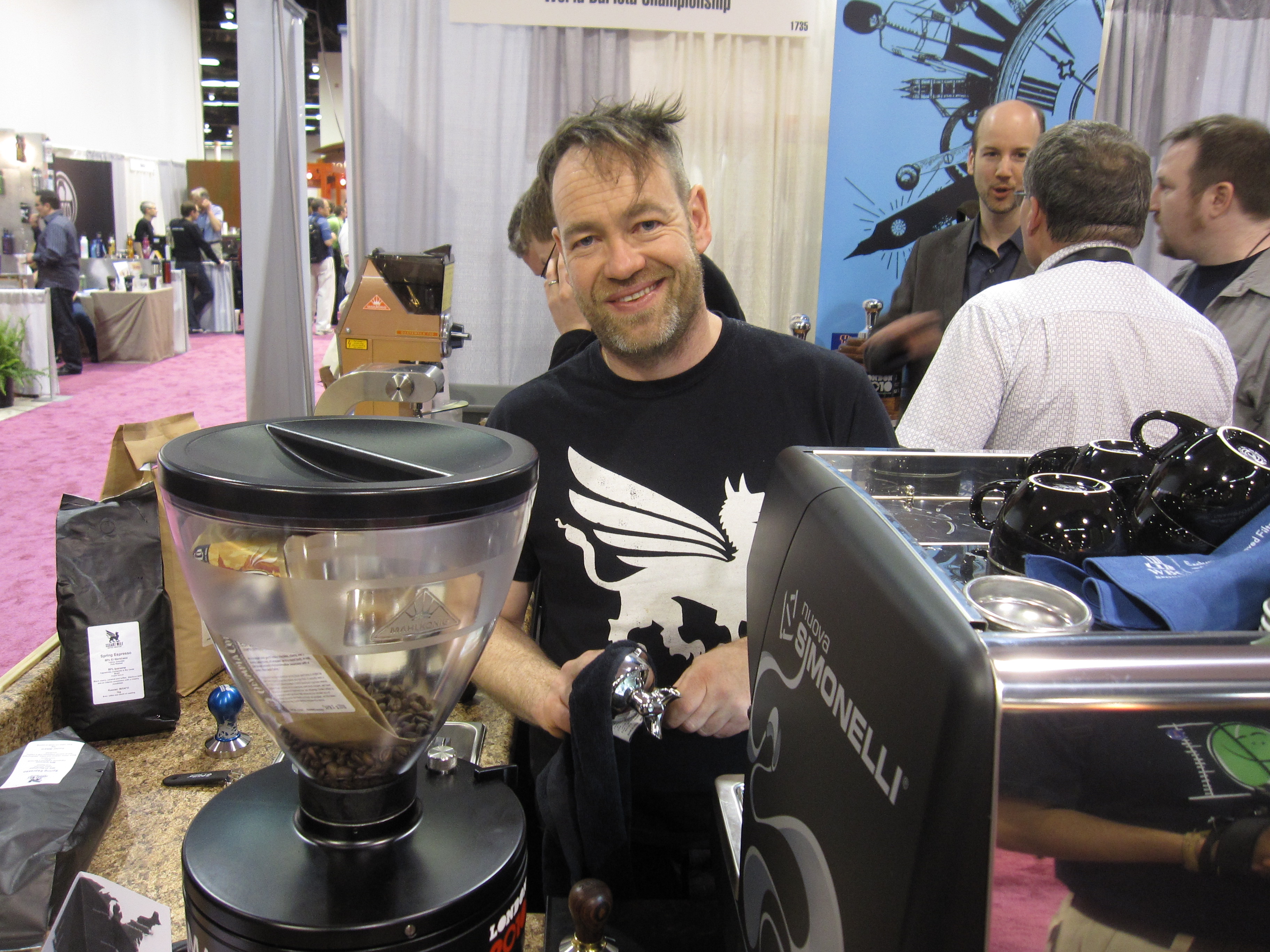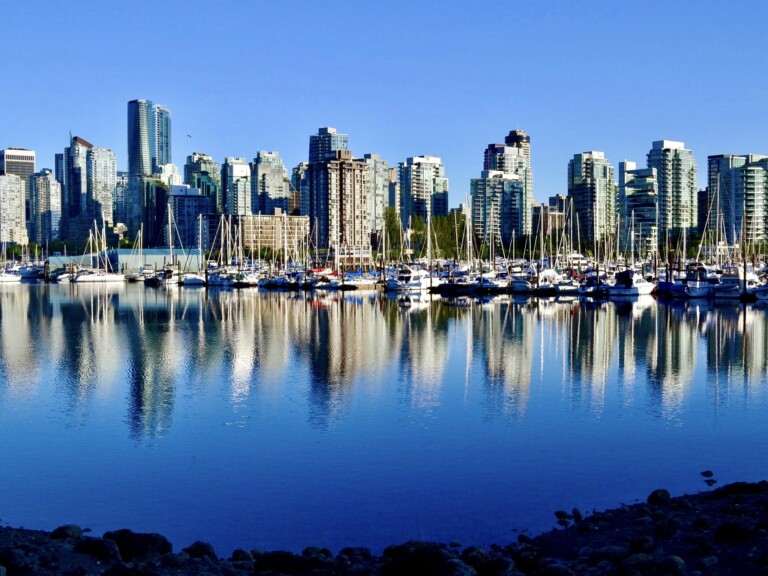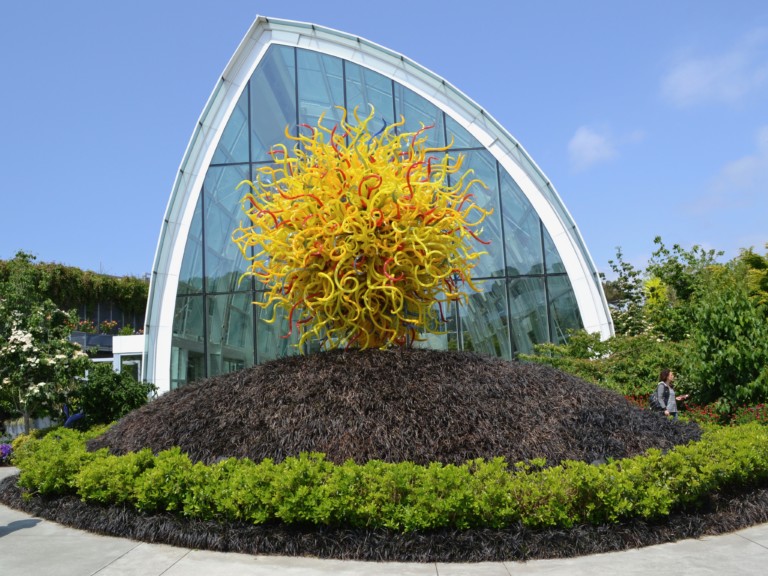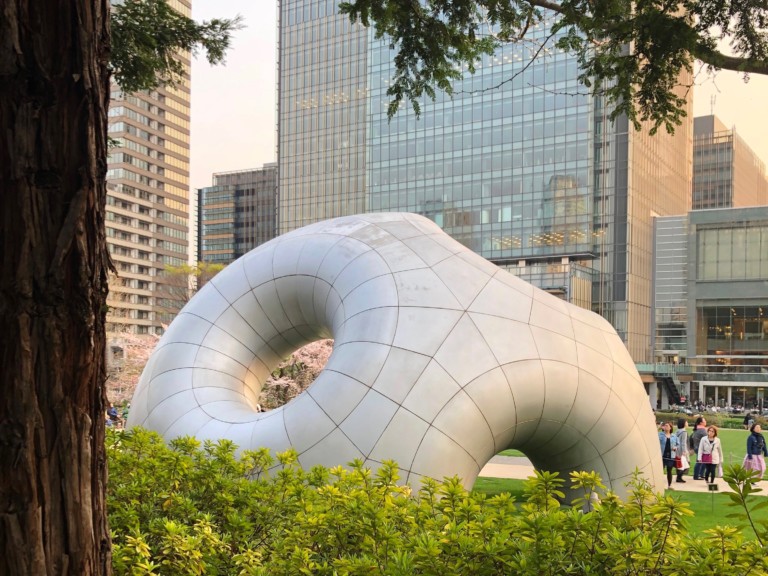Until 2008, longtime coffee pro Gwilym Davies never even thought of competing at a barista championship. He was perfectly content making espresso drinks at his London coffee cart and trading ideas about coffee at area cafes in his spare time. Exposure to World Barista Champions James Hoffman and Stephen Morrissey helped to show that a global coffee community existed, and he wanted to be a part of it. In his only competition season, Davies ran the gauntlet, winning the 2009 World Barista Championship in Atlanta. I recently met Davies in Anaheim, at the SCAA conference, where he discussed his background and inspiration.
What is it that inspires you about coffee?
I really wonder about that, because in London we get people turning up from all over the globe. They come, and all they want is a cup of coffee. And you know that they specifically traveled to do that. And these people aren’t loaded. They’re catching cheap flights. They’re staying on people’s floors. And I don’t know why. I look at them and I go, “Are you mad? What drives you? Why do you get up at 5 o’clock in the morning to do a minimum wage job when you’re obviously bright and talented? You could be doing something else.” And I ask that question of myself when I see it in other people. I think part of it is, I’ve seen what coffee can be like and taste like, and trying to achieve that, that journey is rewarding as you go along. You keep having glimpses of things and experiencing tastes and flavors and discovering new ways to improve what you’re doing, with regards to taste and flavor. And I think it’s that chase that doesn’t actually stop, and it’s really rewarding while you’re chasing it, and I think that’s what drives the passion. Otherwise I haven’t got a clue. Otherwise go and do something much easier.
What was your first coffee memory?
In New Zealand. I’d played around with specialty coffee before, but not like that. In New Zealand, I worked for a café that roasted its own coffee in the evening. It had a really good food menu. The menu was about $5 for lunch, but the flavors they were putting out were remarkable for such a low cost. It was everything you could access. It wasn’t like a high-end restaurant. They took the same care with their coffee as they did with their food, and that was inspiring. I was brushing the floor once and one of the roasters came in, and they had these bags, and on the bags were names of countries, and some of the bags had farm names, and we started talking about processing, and it dawned on me that this was an agricultural product, and along with that comes all the things that can influence taste and flavor.
What was the name of the café?
Atomic, and it’s on Ponsonby Road in Auckland, New Zealand. This was ’97, ’98, and it’s since now changed and become something else. They’ve grown and moved to a roastery. When I got back to England, I went back to my old career.
Which was what?
I used to run high-end health clubs with beauty things. We had a lake that you could fish, as well as gyms. I was the manager and doing risk assessment, and I got away from things that I enjoyed. I was sitting behind a desk. In fact, I worked in the same place as when I went away to New Zealand. I saw what was happening in New Zealand with the cafes, and I went down to London to try to discover the same sort of coffee scene there…It wasn’t happening. So I floundered around in London for a year. It was terrible, I was really disillusioned. Coffee was just a product, and there was a machine around this product. It could have been anything. It was very different than what I experienced in New Zealand, where it was all about the flavor. From there, I discovered a small roastery with this friend of mine, George Fernandez, and the two of us were working together in London. We then moved to work for this roastery, and stayed there, learning about countries of origin. He’s now gone off to set up some lovely cafes in London called Fernandez & Wells. He’s doing some really amazing stuff with food and coffee.
Do you have a first coffee memory?
My first coffee memory is really seeing a sack with a farmer’s name on it. That, rather than the taste, was the first thing that hit me. Then I want on this journey to find, what are these taste differences? How is this coffee grown? What is the process? What’s the flavor?
Why was it important for you to compete in a barista championship?
I ignored barista championships. I never thought they were relevant to me. I was a shop barista and prided myself on putting stuff out fast, communicating with customers, educating. I couldn’t afford to go into competition. I couldn’t afford to go buying copious amounts of tablecloths and glassware. There was not much information on it. None of the firms I worked for were interested in competing, at all. I was never really exposed to competition until James Hoffman and Stephen Morrissey came into town. I didn’t know who James was, I just knew that he was a guy who had information. I at the time was working on a little coffee cart, trying to re-learn how to make coffee. I had been out of London for awhile and things had progressed so much. I had to go back to basics and re-learn everything, which was quite hard, because I’d been in coffee for 9 or 10 years. I had to admit I didn’t know what I was doing. I had to go right back to basics. It was hard to find information. I’m not very apt with computers and didn’t really know where to look. I just knew there was this guy that I’d bump into in cafes that knew stuff. Every time that I saw him in the streets or cafes, I’d literally run after him, pin him down and ask questions. How much water should be in my steam wand? Is it unreasonable to ask my roaster for a roast date? Just basics. Then I figured out he was World Champion, and I went, okay. Then I heard he was going to roast. Then I met Stephen Morrissey. Stephen moved to London and would come with James and help at the cart on Columbia Road. We just had a little bit of fun, and I was learning so much by watching them, and the people they knew astounded me. I’d been working in coffee for many, many more years than them, and they knew this wider community that I never knew existed. I thought I was the only sad individual that was waking up every morning, earning nothing, and really, really enjoying working behind the machine, educating customers and trying to push quality. Then this world is out there. Morrissey explained that, through competing, you have access to this world. You can find this world. I started doing that here. Swapping ideas with people is remarkable. I learned a lot just by listening. So it was accessing this community, that I needed to meet people. The other one was that I wanted to get better. I love my customers, I respect them, but they’re not critical enough. It’s easy – or it was – to exceed their expectations. I was getting no critical feedback from customers. The only way I could do it was through competition. So it’s those two reasons why I competed, really.
So it’s just the one time that you competed?
Yeah.
Would you ever do it again?
No.
Why not?
I actually didn’t like it, in many ways. I competed the first time and was completely stressed. I got some amazing support of course, from James. I realize now just how much support I’d gotten. I walked off stage. I walked straight off stage and into the bar and left everything on stage. Tim Styles tidied up, and all these people just came in, and I sat there, and somebody came and sat next to me, wondering what was up with me. And then I went, “I’m never doing that again, ever.” I don’t know who it was that came in, they went, “I think you will be.” I won a heat, so I had to go to the next stage, I won the nationals, I won again, and for various reasons it took a while to get a visa for the U.S. I nearly didn’t go, so half of me was thinking, that’s fine. Then I got to Atlanta, and I got into the finals, so I had to do the next round. And when I was in the final, I was so pleased, because if I do anything wrong, I’m going to be sixth in the world. If I dropped my cup on the floor, if I made a mess, I’d be sixth in the world. It’s ridiculous. I realized that if I won, I’d never have to compete again. The whole thing took about three levels, from me saying, “James, I think I’d like to compete. Would it be okay to use your coffee?,” to right all the way through to winning. One of the reasons we played around with my routine for the worlds was that I didn’t go there to win. I mean, if we did, I wouldn’t have opened with, “Hello, my name is Gwilym, and I’m here to tell you that espresso is disappointing.” You wouldn’t open your routine with that if you were there to win. We took lots of risks because we wanted to have fun and do something interesting.
How has becoming World Barista Champion changed your life?
Ridiculously. It’s in chaos. My life is in absolute chaos. Because I never even thought of competing until three months prior to that. I didn’t know the rules of the score sheet as well as I could have done. I didn’t actually understand what it means to be the World Champion. I didn’t understand how big a deal it was. I couldn’t comprehend what it meant while I was competing. Afterwards it was quite a shock. I had the perfect lifestyle. I worked as a manager in a coffee place and various things. I came to this point where I realized, I’m not a manager. I’m not an accountant. I like making coffee and I like interacting with customers. That’s what I want to do. I’d organized my life around that. I was living on a boat in London. I was living on a canal boat with my dog. I worked three days a week making coffee, and my partner, she worked two days a week in the same place, a job share. And we kept after our little son. So I spent one day a week going to the different cafes in London chatting to baristas and exchanging ideas, buying and tasting coffees. I spent three days a week making coffee on the cart and one day a week with chores and doing stuff with my son. I had an amazing life, and when this came, it smashed everything. It’s chaos. It’s hard to live on a boat now because of demands on my time.
Is life better now?
It’s different. All the pieces have just been thrown up into the air. I have to wait for them all to come down. I definitely had the perfect life before. Now I’m learning so much. I’m meeting so many wonderful people, and I have so many amazing opportunities I never had. I understand that give back is a responsibility. It was not really designed to win. It was designed to have great fun and push boundaries. I have to take that role and live up to that responsibility. So I have to try and represent baristas, and try and help to see us recognized as a profession, try and make sure that baristas become professional, and start behaving in that way, start realizing that making coffee is more than just putting pretty patents on an espresso drink. There’s so much more too it. We’re going to have to learn a lot.
What’s next for you? Could you see operating a cart anymore?
I’m going to have to let go of the carts. I’m not a businessman, and there are so many fun things to do that I think I’d be tied by the carts. They’ve developed as far as I can develop them, really, so I think it’s time to release them to somebody else. I’ll do something else. I definitely want to experiment more with other brewing methods, have a lot more contact time with customers wanting to learn, training facilities, customers and other baristas.
For your company or for somebody else’s?
Anybody. Anything.
What’s your preferred brewing method when you’re at home?
Simplicity. Filter. Black. Nothing else. I’ve played with other methods, but on a boat, it’s really simple to make a lovely coffee through pourover.
Any pourover in particular?
I really enjoy the Clever. Lovely. Of course now V60 is fun, but before it was just a plastic Melitta cone and a hand grinder. I’ve got so much more to learn.









Blog Comments
Food GPS » Q&A with 2009 World Barista Champion Gwilym Davies | Champion Fans
April 29, 2010 at 2:00 PM
[…] original here: Food GPS » Q&A with 2009 World Barista Champion Gwilym Davies Share and […]
My Yahoo™ Avatar !!! – [ Random Vidz ] By Mujahid Miah | Web Traffic Siphon
April 28, 2010 at 11:53 PM
[…] Food GPS » Q&A wіth 2009 World Barista Champion Gwilym Davies […]